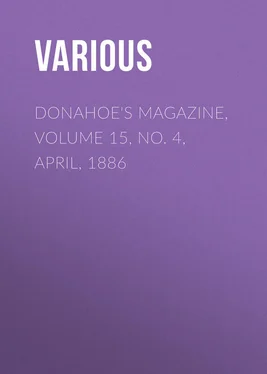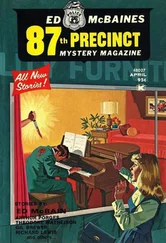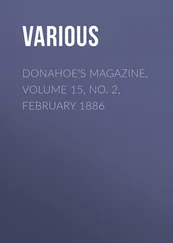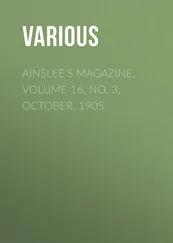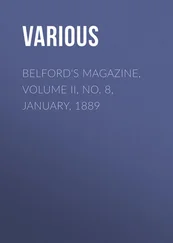Various - Donahoe's Magazine, Volume 15, No. 4, April, 1886
Здесь есть возможность читать онлайн «Various - Donahoe's Magazine, Volume 15, No. 4, April, 1886» — ознакомительный отрывок электронной книги совершенно бесплатно, а после прочтения отрывка купить полную версию. В некоторых случаях можно слушать аудио, скачать через торрент в формате fb2 и присутствует краткое содержание. Издательство: Иностранный паблик, Жанр: periodic, foreign_edu, на английском языке. Описание произведения, (предисловие) а так же отзывы посетителей доступны на портале библиотеки ЛибКат.
- Название:Donahoe's Magazine, Volume 15, No. 4, April, 1886
- Автор:
- Издательство:Иностранный паблик
- Жанр:
- Год:неизвестен
- ISBN:нет данных
- Рейтинг книги:5 / 5. Голосов: 1
-
Избранное:Добавить в избранное
- Отзывы:
-
Ваша оценка:
- 100
- 1
- 2
- 3
- 4
- 5
Donahoe's Magazine, Volume 15, No. 4, April, 1886: краткое содержание, описание и аннотация
Предлагаем к чтению аннотацию, описание, краткое содержание или предисловие (зависит от того, что написал сам автор книги «Donahoe's Magazine, Volume 15, No. 4, April, 1886»). Если вы не нашли необходимую информацию о книге — напишите в комментариях, мы постараемся отыскать её.
Donahoe's Magazine, Volume 15, No. 4, April, 1886 — читать онлайн ознакомительный отрывок
Ниже представлен текст книги, разбитый по страницам. Система сохранения места последней прочитанной страницы, позволяет с удобством читать онлайн бесплатно книгу «Donahoe's Magazine, Volume 15, No. 4, April, 1886», без необходимости каждый раз заново искать на чём Вы остановились. Поставьте закладку, и сможете в любой момент перейти на страницу, на которой закончили чтение.
Интервал:
Закладка:
Night was just falling, when we arrived at Matanzas. The drive to the Hotel de St. Francis, where I determined to stay while in the city, led through a number of narrow and hilly streets, lined on both sides by low, jail-like stone houses, painted as at Havana, in every imaginable color. In the course of about twenty minutes I arrived at the hotel which stands on the Calzada De Tirry, the principal street near the bay. The host, Signor Juan Gonzalez, with a Scotch interpreter who knew Spanish well, received me very heartily at the door. After passing several refreshment saloons and reaching the office, I requested to be shown to my room. I found that it opened, like all the others, on a courtyard, and being the best that could be had, I agreed to remain a guest at the house for $2.50 per day, in gold. Dinner being the next on the programme, I soon found myself at the head of a large table, on both sides of which a number of swarthy, black-eyed, dark-haired coolies and Spaniards were seated. Recognizing me as a padre cure , all bowed and ceased talking as I entered, exchanged courtesies and then resumed an exciting conversation. The meal consisted of a variety of courses. The meats were ingeniously spiced, but rather redolent of garlic. Tropical fruits and vegetables, cooked in all manners of ways, were served up in abundance, and each guest was treated to a bottle of Catalonian wine, which is a very pure and favorite claret in Cuba. This wine is imported from Spain, and a pipe containing one hundred and twenty-five gallons costs about fifty dollars in gold. When dinner was over I retired to my room to find it containing two windows without glass, enclosed by heavy green shutters. The plainest kind of furniture was visible in the apartment. The bed, scantily supplied with clothing, was adorned by a large mosquito net. Anticipating colder evenings in Matanzas than I supposed were peculiar to Havana, owing to the former's situation on so many hills, I requested the waiter to bring me a blanket. This article (being rather unusually used at the Hotel de St. Francis) it took him a long time to find. At last he procured me a peculiar specimen of one, so, resolving to make a virtue of necessity, I placed myself under the protection of heaven and retired to rest. After a sound sleep I was awoke before dawn by the hopping and cooing of numerous doves, whose cots were established not far from my bedroom. The morning soon followed their waking, and eager to gaze on the city and its environs, I made haste to dress and go abroad. The view which greeted my eyes the moment I stood on the balcony outside my door, seemed to me very strange and delightful. The sun was just rising in the east, and in such a soft and lovely sky as the tropics only know. Its calm, golden light fell on the city before me, and on the emerald mountains behind, giving to the villas and gardens that sat on the hills an aspect of unearthly beauty. The doves, finding their society invaded, flocked together and flew over a grassy square, in the midst of which stood immense stores for sugar and molasses. I walked down to the courtyard, admired its fountain, gold-fish, peacock, and tame flamingo. All in the hotel were up before I rose from bed. Cubans take advantage of the early morning, as it is much cooler, and consequently pleasanter to work then than later on in the day. Each guest enjoys a cup of coffee after getting up and takes breakfast about ten o'clock. The coffee in Cuba is well made, and has a most delicious aroma. After taking a cup I went out and saw the street alive with Chinese laborers, who were employed by the city in making extensive repairs. I sauntered towards the Church de San Carlos to hear Mass. On crossing the bridge that spans the San Juan River, which shone in the sunlight as it flowed into the sea, I observed curious-shaped boats, lighters and other craft moving on it, all occupied by queerly-dressed, bronzed, bustling men. Numerous drays and strings of packed mules, carrying heavily laden panniers, raised clouds of dust, from which I was glad to escape on entering the narrow streets near the church. Over the doors of the stores were the customary fancy signs and names. There seemed to be no end to the picturesque street-venders even at this early hour of the morning. A Chinaman, dressed in loose, blue shirt and yellow trousers, passed with a long, flat box on his head, striking it loudly with a short, thick stick, and crying out, "dulces, dulces," – "sweet meats, sweet meats." A panadero (baker) balanced on his cranium a big basket full of rolls, and carried on each arm also a palm-leaved bag full of bread. A tall negress turned a corner, holding a weighty basket, and shouting out at the top of her voice, "Naranges, dulces, naranges, dulces," "sweet oranges, sweet oranges." Soldiers, lottery-ticket venders, and an occasional negro calasero dressed in gorgeous blue jacket, fringed with gold, jack boots reaching to the hips, high silk hat and silver-plated spurs, lent variety to the scene. I soon saw the church of San Carlos, a large building of dark stone, with two lofty towers, one of which had a splendid chime of bells. The edifice within was long and high; its gigantic pillars and great marble altar looked very imposing. When the service was over I returned to my hotel, intending to visit the priests after breakfast. When the meal was despatched, eleven o'clock found me in the presence of Father Francisco de P. Barnada, Cura Vicario Parroco Ecclesiastico, and Phro Jose Saenz, one of his assistants. Being a stranger, the pastor had some slight suspicions about my orthodoxy; but these were soon dispelled when he read my letters of introduction. I could see at once that, though strict, he was a very cheerful, hospitable gentleman. His bright and pleasing features indicated the presence of a brilliant mind and a tender heart. Father Jose Saenz was the life and soul of cheerfulness and kindness. I found myself at home immediately with these excellent priests, and we chatted together very pleasantly for about an hour, on a variety of subjects. Bits of Latin, English and Spanish were our channels of expression. The quarters of the priests were simple, but comfortable, and communicated directly with the church.
On suggesting that I would like to see the famous valley of the Yumuri, Father Barnada had me introduced to an engaging and intelligent young Cuban named Signor Joaquin Mariano, who volunteered at once to accompany me on my ramble.
The most interesting though longest way to the valley is to walk along the banks of the Yumuri River from a point a little above the beautiful bridge near that part of the town called Versailles. Here the costly and grand church of St. Peter's can be seen rising, with its beautiful spires, above every other building. On our way to the valley we were at first obliged to pass objects not very inviting, such as city rubbish, luxuriant weeds, yelping dogs, grunting pigs, tanneries and dilapidated houses; but these soon yielded to grassy lanes, charmingly picturesque little dwellings perched on rocks in regular staircase position, and gardens full of exquisite fruit trees and flowers. The road is now perfectly clean and level, edged on one side by the bright, placid river, and on the other by steep rocks and quarries, in the cool nooks of which large, lovely ferns, air plants, and numerous wild flowers bloom. Here we noticed a handsome private residence, fronted by a stone wall crowned with cacti, and guarded at the rear by stupendous cliffs. Sago and date palms grew near the narrow road. We saw tremendous openings in the bare-ribbed mountains on the other edge of the stream. Pieces of rock overhead looked down like dead sea-lions and quarters of beef. Blossoms of every hue peeped out through the old black rocks beside us; millions of insects rushed pell-mell out of the crevices of the shining stone, and while we looked, the breeze from the rippling river shook millions of neighboring flowers, scattered their perfumes broadcast, and thus afforded us an exquisite treat away from the heat, dust, and noise of the city. Gazing up, we saw birds' nests in the limbs of trees, naked roots of large bushes and vines clinging like net-work to their rocky bed, and century plants growing in profusion where they could scarcely get an inch of soil. These cliffs must have been two hundred feet high, and on looking up one would imagine that the almost disjointed masses of hanging rock would fall down at any moment and crush us to pieces. Turkey buzzards, with their black bodies and pink bills, were screaming overhead on the tops of big limbs, and anxiously looking out for prey. The fair blue sky above looked down on the lines of green, wild shrubs that flourished amid beds of solid rock. Sun and candelabra flowers, big as cups and orange in hue, with stalks like the bananas or Indian corn, sprung out of the cliffs to the height of twenty feet. Morning glories, rare lichens, violets, dresinas, and century plants grew by their side, while the silky Spanish moss, suspended from a higher point, threw a veil of beauty over all. A curve in the walk brought us into the valley. On the other side of the river we saw sand-hills crowned with emerald mountains and groves of palm. The plain, as far as it could be seen, was one sheet of verdure, and the stream widening at this point into a lake, was adorned with woody islands. Birds, breezes and the echoes of the hammer's sound in the quarries supplied natural music. As far as the eye could see, the valley was surrounded by mountains. The lofty, rocky wall continued to the left, exposing to our view its beautiful cream-colored layers of granite, fringed with lichens and ferns, and surrounded by weirdly-carved roots and branches of gray stone. All before us looked charming. The narrow foot-path in the long grass, the wild flowers everywhere, the old kiln, embraced by parasites, convolvulus and jasmines, the brushwood rustling with little reptiles, the flying fish in the stream, an old negro rolling a barrow full of leaves, the Indian mounds having figures of lions and human heads carved out of the rock, the ever-royal palm with its mistletoes and berries, its blood-red tassels on the smooth, hard trunk, its long, feathery leaves, ever falling like ribbons or streamers into various situations by the force of the breeze; all, all looked beautiful. And to add to our delight the sounds of the Angelus from the tower of the church of Monserrat, at the top of the mountain at hand came down on our ears like music from heaven. The mountains around this valley of peace seemed to echo the melodies of God. The cross on the beautiful Corinthian Church, shone between the hills and the sky, reminding us of Him who died for us, and who holds all creation in His hands. All the lovely objects in this tropical vale seemed to murmur His praises. The palms reminded us of His wanderings in the desert, when a child, of His domestic life at Nazareth, and His latter years in and around Jerusalem and Galilee.
Читать дальшеИнтервал:
Закладка:
Похожие книги на «Donahoe's Magazine, Volume 15, No. 4, April, 1886»
Представляем Вашему вниманию похожие книги на «Donahoe's Magazine, Volume 15, No. 4, April, 1886» списком для выбора. Мы отобрали схожую по названию и смыслу литературу в надежде предоставить читателям больше вариантов отыскать новые, интересные, ещё непрочитанные произведения.
Обсуждение, отзывы о книге «Donahoe's Magazine, Volume 15, No. 4, April, 1886» и просто собственные мнения читателей. Оставьте ваши комментарии, напишите, что Вы думаете о произведении, его смысле или главных героях. Укажите что конкретно понравилось, а что нет, и почему Вы так считаете.
